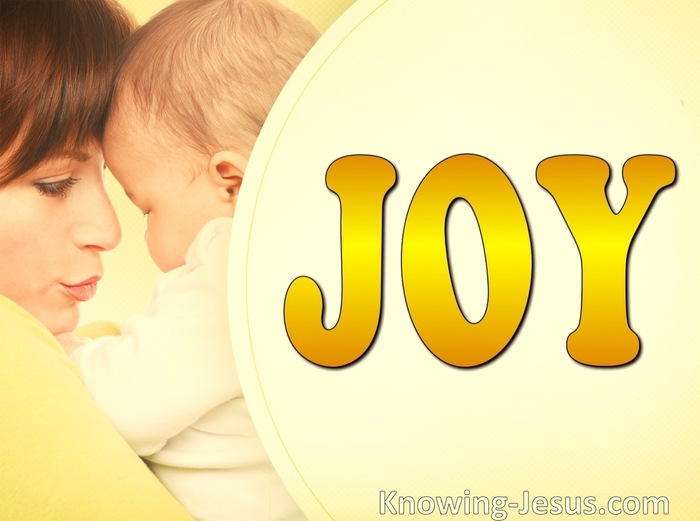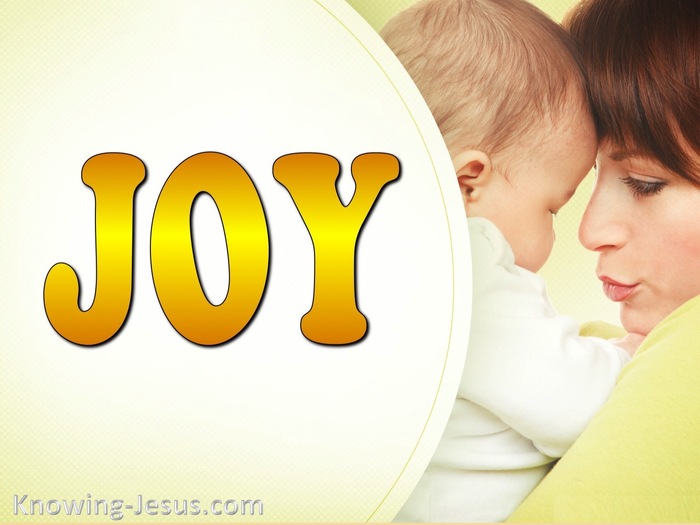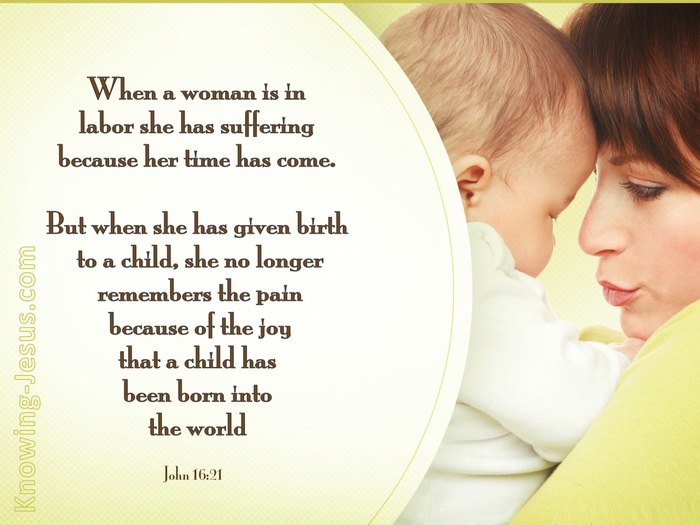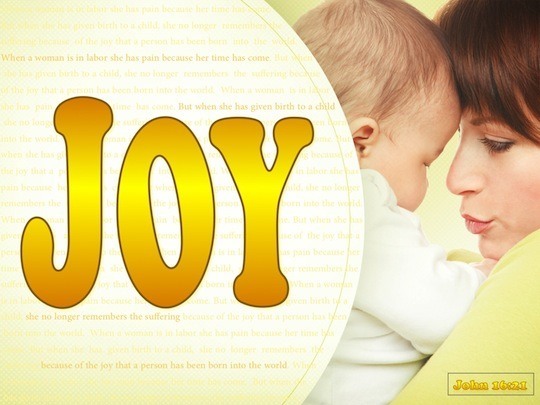Parallel Verses
Twentieth Century New Testament
A woman in labor is in pain because her time has come; but no sooner is the child born, than she forgets her trouble in her joy that a man has been born into the world.
New American Standard Bible
King James Version
A woman when she is in travail hath sorrow, because her hour is come: but as soon as she is delivered of the child, she remembereth no more the anguish, for joy that a man is born into the world.
Holman Bible
International Standard Version
When a woman is in labor she has pain, because her time has come. Yet when she has given birth to her child, she doesn't remember the agony anymore because of the joy of having brought a human being into the world.
A Conservative Version
When a woman brings forth she has pain because her hour has come. But when she has given birth to the child she no longer remembers the anguish because of the joy that a man was born into the world.
American Standard Version
A woman when she is in travail hath sorrow, because her hour is come: but when she is delivered of the child, she remembereth no more the anguish, for the joy that a man is born into the world.
Amplified
An Understandable Version
A woman has pain when giving birth because her time has come. But when the child is born, she does not remember the intense suffering because she is so happy over the child being born into the world.
Anderson New Testament
A woman, when she is in labor, has sorrow, be cause her hour has come; but when the child is born, she no longer remembers the pain, for joy that a man is born into the world.
Bible in Basic English
When a woman is about to give birth she has sorrow, because her hour is come; but when she has given birth to the child, the pain is put out of her mind by the joy that a man has come into the world.
Common New Testament
When a woman is in labor she has sorrow, because her hour has come; but as soon as she gives birth to the child, she no longer remembers the anguish, for joy that a child has been born into the world.
Daniel Mace New Testament
a woman when she is in travail, is afflicted at the approach of her pains: but as soon as she is delivered of the child, the remembrance of her anguish, is lost in her joy, that a man is born into the world.
Darby Translation
A woman, when she gives birth to a child, has grief because her hour has come; but when the child is born, she no longer remembers the trouble, on account of the joy that a man has been born into the world.
Godbey New Testament
When a woman may bring forth she has sorrow, because her hour has come: but when the little child may be born, she remembers her suffering no more, for the joy that a man has been born into the world.
Goodspeed New Testament
When a woman is in labor she is sorrowful, for her time has come; but when the child is born, she forgets her pain in her joy that a human being has been brought into the world.
John Wesley New Testament
A woman when she is in travel, hath sorrow, because her hour is come; but when she is delivered of the child, she no longer remembreth the anguish, for joy that a man is born into the world.
Julia Smith Translation
A woman when she should bring forth, has grief, because her hour has come: and when the child should be born, she no more remembers the anguish, for the joy that a man was born into the world.
King James 2000
A woman when she is in travail has sorrow, because her hour has come: but as soon as she is delivered of the child, she remembers no more the anguish, for joy that a man is born into the world.
Lexham Expanded Bible
A woman, when she gives birth, experiences pain because her hour has come. But when [her] child is born, she no longer remembers the affliction, on account of the joy that a human being has been born into the world.
Modern King James verseion
The woman has grief when she bears, because her hour has come. But when she brings forth the child, she no longer remembers the anguish, because of the joy that a man is born into the world.
Modern Spelling Tyndale-Coverdale
A woman when she travaileth hath sorrow, because her hour is come: but as soon as she is delivered of the child she remembereth no more the anguish, for joy that a man is born into the world.
Moffatt New Testament
When a woman is in labour she is sorry, for her time has come; but when the child is born she remembers her anguish no longer, for joy that a human being has been born into the world:
Montgomery New Testament
A woman in labor has grief because her hour is come; but when she has given birth to the babe she no longer remembers her anguish, because of joy that a child has been born into the world.
NET Bible
When a woman gives birth, she has distress because her time has come, but when her child is born, she no longer remembers the suffering because of her joy that a human being has been born into the world.
New Heart English Bible
A woman, when she gives birth, has pain, because her time has come. But when she has delivered the child, she does not remember the anguish any more, for the joy that a human being is born into the world.
Noyes New Testament
A woman when she is in travail hath sorrow, because her hour is come; but as soon as she is delivered of the child, she remembereth no more the anguish, through joy that a man is born into the world.
Sawyer New Testament
For when a woman is in labor she has pain, because her time has come; but when she has borne the child she no longer remembers the distress, because of joy that a man is born into the world.
The Emphasized Bible
A woman, as soon as she is about to bring forth, hath, grief, because her hour hath come; but, as soon as she hath given birth to the child, no longer, remembereth she the anguish, by reason of the joy, that a human being into the world hath been born.
Thomas Haweis New Testament
A woman when she is in travail hath sorrow, because her hour is come: but when the little son is born, she no more remembers the anguish, for joy that a man is brought into the world.
Webster
A woman when she is in travail hath sorrow, because her hour is come: but as soon as she is delivered of the child, she remembereth no more the anguish, for joy that a man is born into the world.
Weymouth New Testament
A woman, when she is in labour, has sorrow, because her time has come. But when she has given birth to the babe, she no longer remembers the pain, because of her joy at a child being born into the world.
Williams New Testament
When a woman is in labor, she is in pain, for her time has come, but when the baby is born, she forgets her pain because of her joy that a human being has been born into the world.
World English Bible
A woman, when she gives birth, has sorrow, because her time has come. But when she has delivered the child, she doesn't remember the anguish any more, for the joy that a human being is born into the world.
Worrell New Testament
A woman, when she is in travail, has sorrow, because her hour came; but, when she bears the child, she no longer remembers the anguish, because of the joy that a man was born into the world.
Worsley New Testament
A woman when she is in labor, hath sorrow, because her hour is come; but when she is delivered of the child, she thinks no more of the anguish, for joy, that a man is born into the world.
Youngs Literal Translation
'The woman, when she may bear, hath sorrow, because her hour did come, and when she may bear the child, no more doth she remember the anguish, because of the joy that a man was born to the world.
Themes
Coming of the lord jesus Christ » The lord going away only to return later
Love » The reward for loving the lord
Topics
Interlinear
Tikto
De
Gennao
Dia
Devotionals
Devotionals about John 16:21
Devotionals containing John 16:21
References
Easton
Hastings
Word Count of 37 Translations in John 16:21
Prayers for John 16:21
Verse Info
Context Readings
Jesus Predicts His Return To The Disciples
20 In truth I tell you that you will weep and mourn, but the world will rejoice; you will suffer pain, but your pain shall turn to joy. 21 A woman in labor is in pain because her time has come; but no sooner is the child born, than she forgets her trouble in her joy that a man has been born into the world. 22 You, in the same way, are sorry now; but I shall see you again, and your hearts will rejoice, and no one will rob you of your joy.
Names
Cross References
1 Thessalonians 5:3
When people are saying 'All is quiet and safe,' it is then that, like birth-pains upon a woman with child, Ruin comes suddenly upon them, and there will be no escape!
Luke 1:57-58
When Elizabeth's time came, she gave birth to a son;
Galatians 4:27
For Scripture says--'Rejoice, thou barren one, who dost never bear, Break into shouts, thou who art never in labor, For many are the children of her who is desolate--aye, more than of her who has a husband.'
Revelation 12:2-5
She was with child; and 'she is crying out in the pain and agony of childbirth.'






